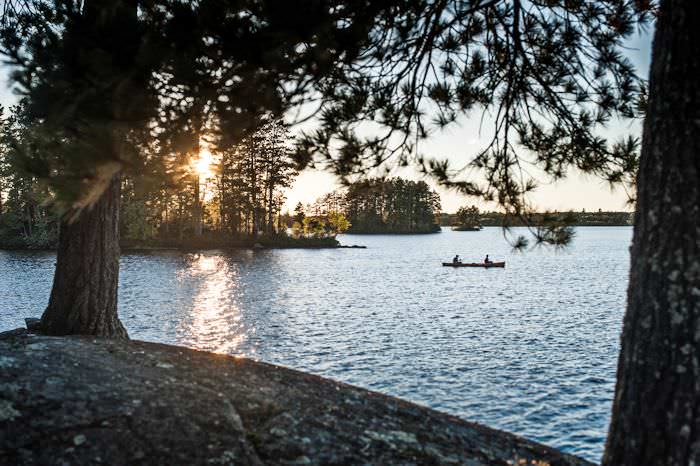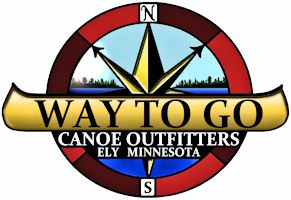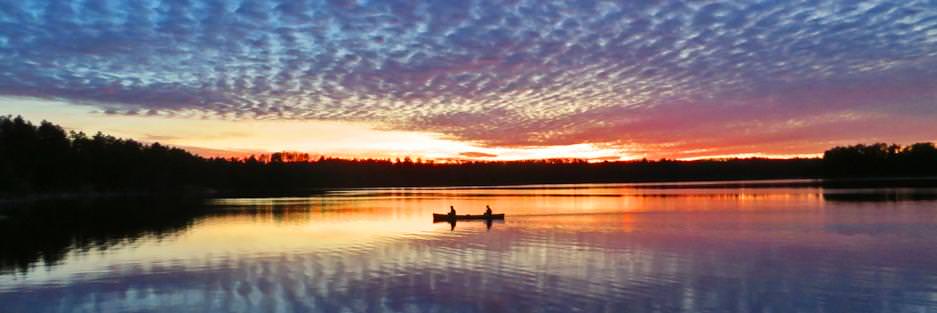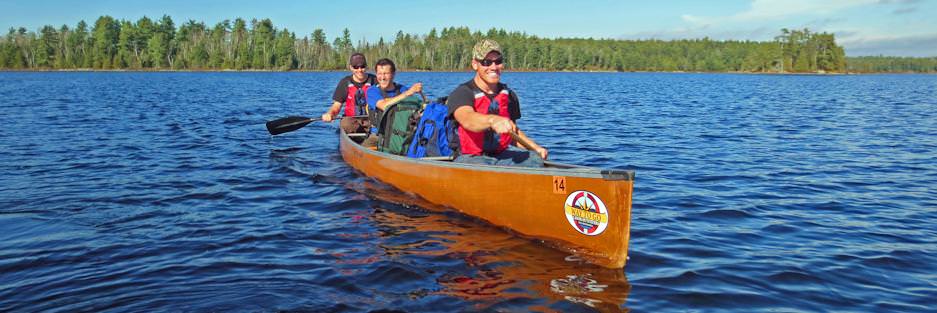Boundary Waters Canoe Area Wilderness (BWCAW) Information
About The BWCAW Travel Permits Voyageur Planning Map BWCAW Entry Points Rules & Regulations
About The BWCAW
The Boundary Waters Canoe Area Wilderness, located within the Superior National Forest in northeastern Minnesota, is a 1,090,000-acre designated wilderness area. It extends nearly 150 miles along the international border between the U.S. and Canada. Once the homeland of the Sioux, and later, Ojibwe peoples, the Boundary Waters contains numerous exhibits of Native American pictographs, or paintings, on rock ledges and cliff faces throughout the wilderness area. During the period of the Fur Trade from the early 1700s to the early 1800s, the lakes and forests of the region were frequently traversed by voyageurs paddling and portaging large birch bark canoes laden with furs bound for a Hudson's Bay Company post, or the North West Company forts, one of which was located at Grand Portage on Lake Superior.
The BWCAW had originally begun to be set aside and preserved through a series of federal acts in the 1920s and '30s, but it was the Wilderness Act of 1964 that laid the framework for the inclusion of the Boundary Waters into the National Wilderness Preservation System. The Boundary Waters Canoe Area Wilderness Act of 1978 established the primary rules and regulations governing the BWCAW then, as they still do today. With over 1,000 lakes and more than 2,000 wilderness campsites, the recreational opportunities for canoeing, camping, fishing, hiking, photography, and much, much more, are endless in the BWCAW. Once you have spent a little time here, you will better appreciate the wisdom and foresight employed in establishing the Wilderness Act of 1964, which defined wilderness thusly:
"A wilderness, in contrast with those areas where man and his own works dominate the landscape, is hereby recognized as an area where the earth and its community of life are untrammeled by man, where man himself is a visitor who does not remain."
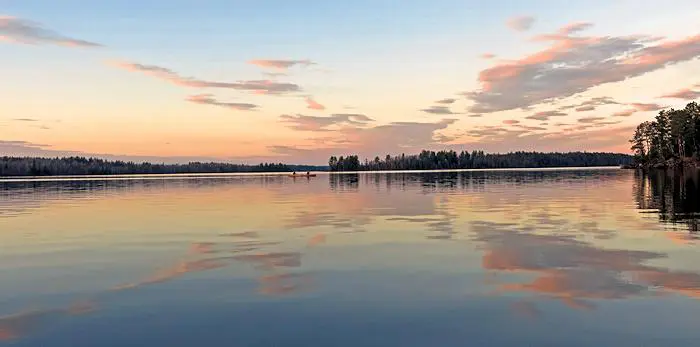
Travel Permits — BWCAW
The U.S. Forest Service requires that any group planning an overnight canoe trip into the BWCAW from May 1st through September 30th must obtain a quota travel permit. For all other dates of the year, a self-issued (non-quota) permit is required. The quota system regulates how many groups can begin a trip at each Entry Point each day. One permit per traveling group covers up to 9 people and 4 canoes. (Larger groups need multiple permits, but please note the stipulations under "BWCA Rules & Regulations: Group Sizes" below.) Parties may only enter the BWCAW on the entry date and through the Entry Point specified on the permit. Since there are a limited number of quota permits available for each Entry Point each day, Way to Go Canoe Outfitters recommends making your travel permit reservation well in advance of your trip date. But even if you make a last-minute decision to come up on a canoe trip, give us a call! We'll check to see what permits are available and design a trip route with that in mind. Quota permits are issued on a first come, first served basis beginning the last Wednesday of January each year. We will gladly assist you in reserving the travel permit you need for your wilderness canoe trip. Call us at 218-365-7676 when you know your dates and are ready to discuss your options. We will help you determine a route plan and provide easy instructions for ordering your permit online.
BWCAW Permit Reservation
To reserve your BWCA permit with recreation.gov, click here, then click on Permits > Boundary Waters Canoe Area Wilderness > Explore Available Permits to get started, then follow our easy instructions that we can provide to finish the process and secure your permit. Have your credit card handy.
Fees Charged:
All overnight visitors from May 1st through September 30th must pay the following User Fees:
16.00 per Adult per trip
$8.00 per Youth aged 17 and under per trip
In addition to the User Fees, the permit office charges a single, non-refundable reservation fee of $6.00 per permit. All fees are payable by credit card during the permit reservation process.
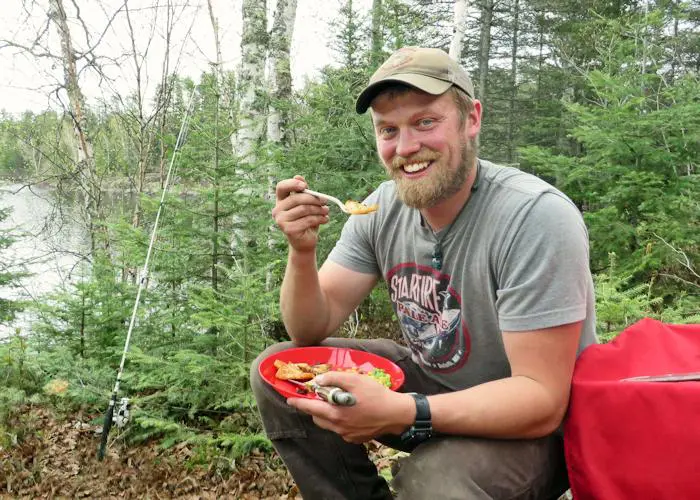
BWCA: Home of the Man Eating Fish
Voyageur Planning Map
Begin planning your canoe trip route with Voyageur Maps of the Boundary Waters Canoe Area Wilderness. There are 10 maps that cover the entire BWCAW, featuring entry points (indicated by a black rectangle with the entry point number), campsites (indicated by red triangles), topographical lines, lake depth hydrographical lines, portages, and more.
You can study these maps on your own, but we especially like the capability they give us to discuss potential canoe routes with you over the phone.
Here at our outfitting base, we offer maps by Voyageur Maps, W.A. Fisher, and McKenzie Maps. We will mark your actual navigational maps with a lot more details, such as favorite campsites, fishing hot spots, points of interest, etc., once we all gather ‘round the routing table.
Entry Points
Boundary Waters Canoe Area Wilderness
Entry Point Numbers, Names, and Daily Quotas*
| Entry Point # | Name | Daily Quota |
|---|---|---|
| 4 | Crab Lake & Cummings Lake | 4 |
| 6 | Slim Lake | 2 |
| 7 | Big Lake | 2 |
| 8 | Moose River South | 1 |
| 9 | Indian Sioux River-South | 1 |
| 14 | Indian Sioux River-North | 6 |
| 16 | Moose/Portage River North | 7 |
| 19 | Stuart River | 1 |
| 20 | Angleworm Lake | 2 |
| 23 | Mudro Lake | 6 |
| 24 | Fall Lake | 14 |
| 25 | Moose Lake | 27 |
| 26 | Wood Lake | 2 |
| 27 | Snowbank Lake | 8 |
| 29 | North Kawishiwi River (Access through Ojibway & Triangle Lakes) | 1 |
| 30 | Lake One | 18 |
| 31 | Farm Lake | 3 |
| 32 | South Kawishiwi River | 2 |
| 33 | Little Gabbro Lake | 2 |
| 34 | Island River | 3 |
| 35 | Isabella Lake | 3 |
| 36 | Hog Creek | 5 |
| 37 | Kawishiwi Lake | 9 |
| 38 | Sawbill Lake | 14 |
| 75 | Little Isabella River | 1 |
| 77 | South Hegman Lake | 2 |
| 84 | Snake River | 1 |
*Daily Quota = Number of groups (max. 9 people per group) per day
About The BWCAW Travel Permits Voyageur Planning Map BWCAW Entry Points Rules & Regulations
